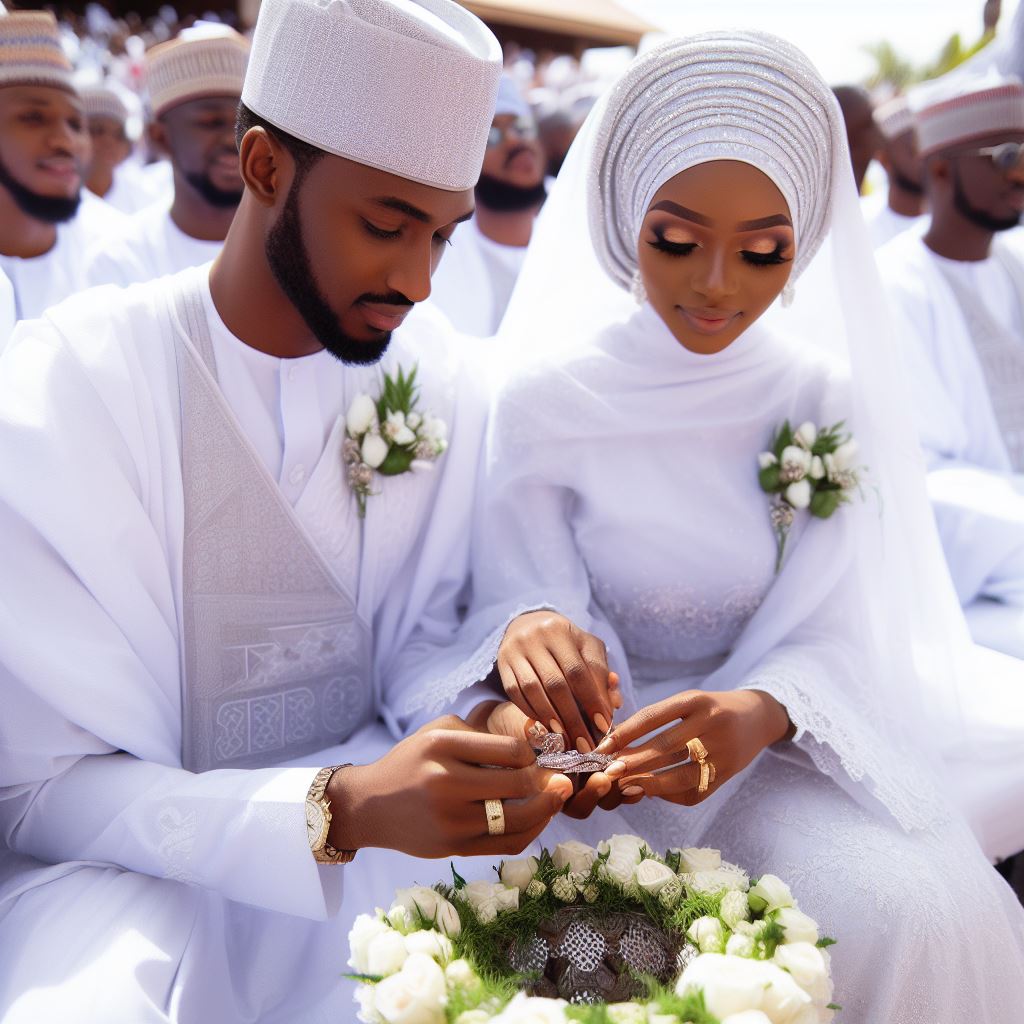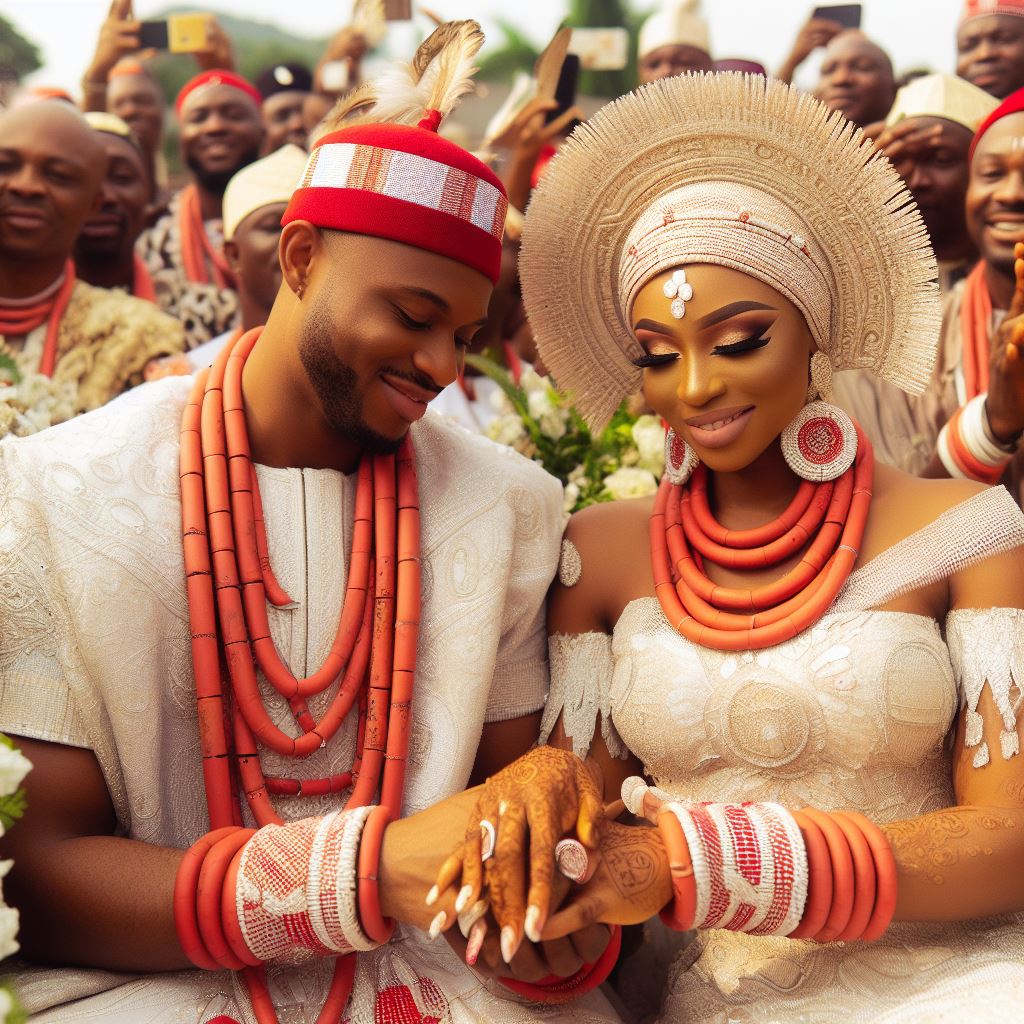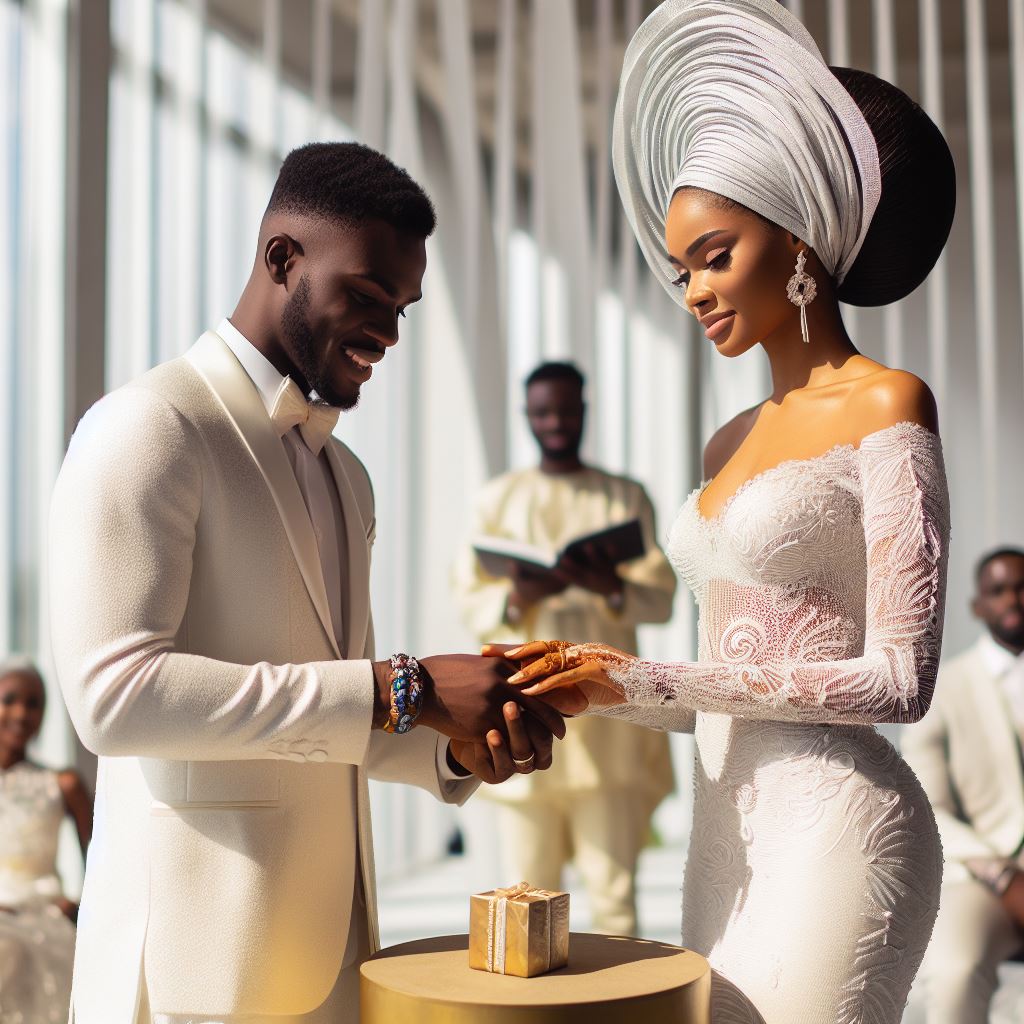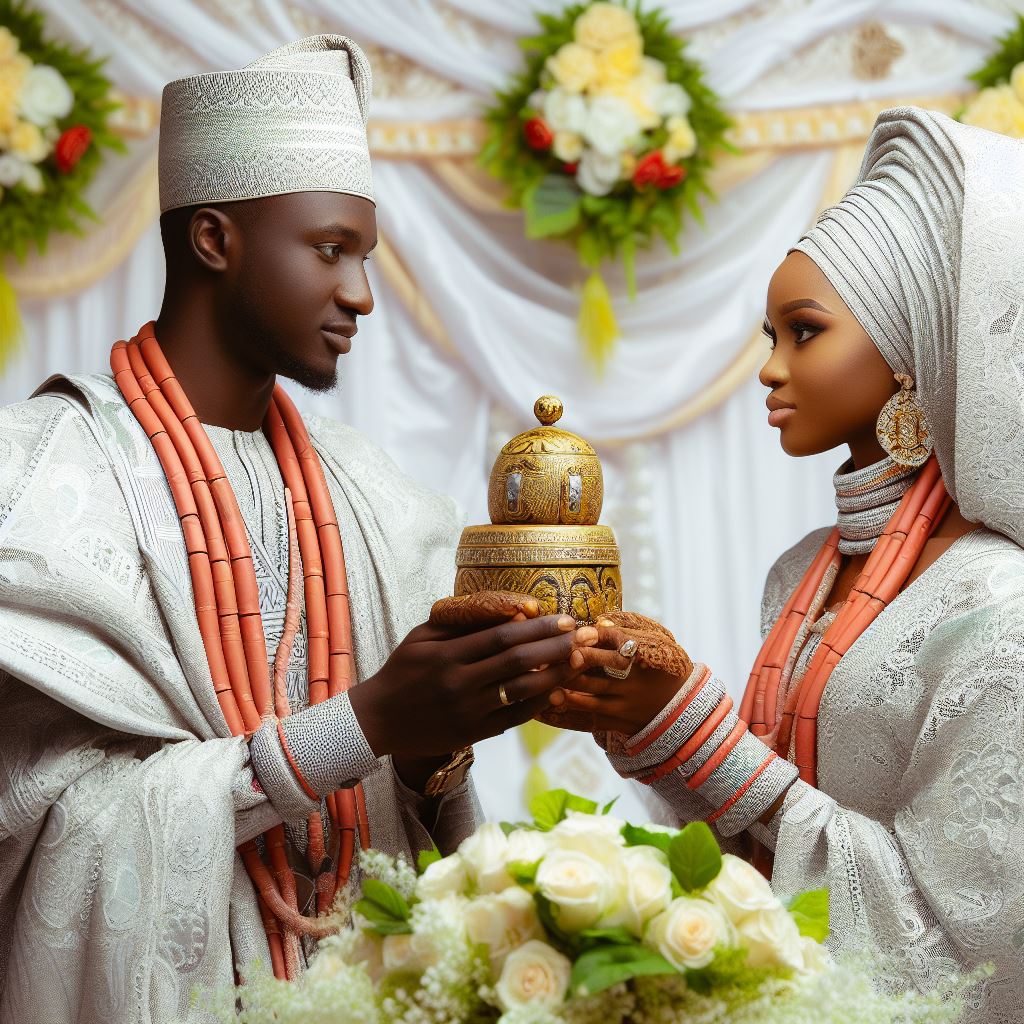Introduction
Marriage in Nigeria holds great significance within the cultural and religious framework.
Vows play a vital role in marriage ceremonies, symbolizing commitment and promises for a lifelong union.
This blog post aims to compare Christian and Islamic vows in Nigeria, shedding light on their similarities and differences.
Marriage holds immense value within Nigerian society, being a union not just between two individuals but also between families.
It is a sacred institution that carries cultural, religious, and legal implications.
Vows form an integral part of marriage ceremonies as they serve as a public declaration of the couple’s commitment and love for each other.
They shape the foundation of the marital bond and are meant to be upheld throughout the journey of marriage.
In this blog post, we will explore and compare Christian and Islamic vows in Nigeria, focusing on the words and rituals used during the respective ceremonies.
By highlighting the unique aspects of each tradition, we aim to foster a better understanding of the diverse marriage practices in the country.
Through this comparison, we hope to encourage mutual respect and appreciation for the religious and cultural diversity in Nigeria.
It is essential to recognize and celebrate the differences in marriage traditions while also emphasizing the common values of love, commitment, and partnership that unite couples across different faiths.
Join us on this insightful journey as we delve into the intricacies of Christian and Islamic vows in Nigeria, gaining a deeper understanding of the rich tapestry of marriage customs in this diverse nation.
Read: Addressing Extended Family Conflicts in Nigerian Marriages
Christian Wedding Vows in Nigeria
Christian wedding ceremonies and rituals vary across different denominations in Nigeria.
These ceremonies are filled with symbolism and are considered sacred.
One of the most important aspects of Christian weddings is the exchange of vows between the bride and the groom.
Explanation of Christian Wedding Ceremonies and Rituals
Christian wedding ceremonies in Nigeria are usually held in churches.
The ceremony is officiated by a pastor or a priest and is witnessed by friends, family, and members of the congregation.
The rituals include prayers, scripture readings, and the exchange of wedding vows.
Traditional Christian Wedding Vows
In a traditional Christian wedding in Nigeria, the bride and groom recite vows to each other.
These vows are a declaration of their love, commitment, and willingness to spend their lives together.
The vows are a solemn promise made in the presence of God and the witnesses.
Explanation and Examples of Common Christian Vows
Common Christian wedding vows in Nigeria often include phrases such as “to have and to hold, from this day forward,” “to love and cherish,” and “for better or for worse.”
These vows express the couple’s commitment to stand by each other in good times and bad.
Variation in Christian Vows across Different Denominations
Christian wedding vows may vary across different denominations in Nigeria.
The variation lies in the wording and structure of the vows.
Catholic vows, for example, may include additional promises to raise children in the Catholic faith, while Orthodox vows may emphasize the importance of honoring religious customs.
Comparison of Catholic, Protestant, and Orthodox Vows
In Catholic wedding vows, the couple may promise to accept children lovingly from God and raise them according to the Catholic faith.
Protestant vows usually focus on the couple’s commitment to love, honor, and support each other.
Orthodox vows, on the other hand, emphasize the couple’s dedication to following religious traditions.
Implications and Interpretations of Christian Wedding Vows in Nigeria
Christian wedding vows hold deep meaning and significance in Nigeria.
They are seen as a solemn promise made before God and the church community.
These vows signify the couple’s intention to build a strong, lasting, and faithful marriage based on Christian values.
The interpretation of these vows is subjective and depends on personal beliefs and convictions.
In essence, Christian wedding vows are an integral part of wedding ceremonies in Nigeria.
They symbolize the commitment, love, and faith that the couple has for each other and for God.
The variation in vows across different denominations adds richness and diversity to the Christian wedding tradition in Nigeria.
Read: Building Trust After Betrayal: A Guide for Nigerian Spouses
Islamic Wedding Vows in Nigeria
In Nigeria, Islamic marriage ceremonies and rituals are an integral part of the wedding traditions.
Islamic wedding vows hold great importance in the Nikah contract, creating a sacred bond between the bride and groom.
Explanation of Islamic Marriage Ceremonies and Rituals
Islamic marriage ceremonies in Nigeria begin with a formal proposal known as the “Ijab.”
The groom’s family requests the bride’s hand in marriage, and the bride’s family responds with the “Qabul,” accepting the proposal.
The “Nikkah” is the actual wedding ceremony, conducted by a religious leader or Imam.
The ceremony includes recitation of verses from the Quran, prayers, and the exchange of wedding vows.
Traditional Islamic Wedding Vows
Islamic wedding vows typically follow a traditional format, reflecting the commitment and responsibilities of marriage.
The groom makes the vow first, followed by the bride.
- “I, [Groom’s Name], take you, [Bride’s Name], as my lawfully wedded wife, to have and to hold,
- from this day forward, for better or for worse, for richer or for poorer,
- in sickness and in health, to love and to cherish, till death do us part.”
The bride replies:
- “I, [Bride’s Name], accept you, [Groom’s Name], as my lawfully wedded husband, to have and to hold,
- from this day forward, for better or for worse, for richer or for poorer,
- in sickness and in health, to love and to cherish, till death do us part.”
Explanation and Examples of Common Islamic Vows
Islamic wedding vows often include promises of love, fidelity, and lifelong commitment.
Some common examples of Islamic wedding vows in Nigeria are:
- “I promise to be your partner, sharing joys and sorrows, supporting and caring for you.”
- “I vow to protect and honor you and provide for our family to the best of my abilities.”
- “I promise to be faithful and loyal to you, and to seek Allah’s guidance in all aspects of our marriage.”
Significance of Islamic Vows in the Nikah Contract
Islamic vows hold significant importance as they form part of the Nikah contract, legally binding the couple together as husband and wife.
The Nikah contract outlines the rights and responsibilities of both the bride and groom, including financial obligations, inheritance rights, and principles of respect and mutual support.
Differences in Islamic Vows between Sunni and Shia Sects
While the basic principles of Islamic wedding vows remain the same, there may be slight variations between Sunni and Shia wedding ceremonies in Nigeria.
Sunni Muslims often recite additional prayers and seek blessings from the congregation, emphasizing unity and community participation.
Shia Muslims, on the other hand, may include specific vows related to their beliefs and practices, expressing their commitment to the Ahl al-Bayt (the family of the Prophet Muhammad).
Interpreting Islamic Wedding Vows in the Nigerian Context
In Nigeria, Islamic wedding vows are understood within the cultural context of the country, combining Islamic traditions with local customs and beliefs.
The vows reflect the couple’s commitment to each other, their families, and the community, reinforcing the values of love, respect, and lifelong partnership.
Overall, Islamic wedding vows in Nigeria serve as a beautiful reminder of the sacred bond between a husband and wife, strengthening their commitment to each other and Allah.
Read: Evolving Gender Roles: Implications for Marriages in Nigeria

Similarities and Differences between Christian and Islamic Vows in Nigeria
Comparing Christian & Islamic Vows in Nigeria
Introduction:
Wedding vows are an integral part of the marriage ceremony in both the Christian and Islamic traditions in Nigeria.
While these two religions have distinct beliefs and practices, there are also several similarities and differences in the structure, content, and religious undertones of their vows.
Additionally, cultural practices and traditions, as well as the rise of interfaith marriages, have also influenced the way wedding vows are exchanged in Nigeria.
Similarities between Christian and Islamic Vows
- Commitment to love and respect: Both Christian and Islamic vows emphasize the importance of love, respect, and loyalty towards one’s spouse.
- Promise of support and companionship: Both types of vows include a promise to support, comfort, and be a lifelong companion to the partner.
- Shared spiritual principles: Both Christian and Islamic vows often draw from the respective religious scriptures and include references to God and religious values.
- Commitment to fidelity: Both Christian and Islamic vows include a promise to remain faithful and exclusive to one’s spouse.
Differences between Christian and Islamic Vows
- Structure and content: Christian vows are typically longer and may include personalized statements, while Islamic vows are often shorter and rely on traditional phrases from the Quran.
- Religious undertones: Christian vows may specifically mention the Holy Trinity, while Islamic vows often highlight the oneness of Allah and the teachings of Prophet Muhammad.
- Role of witnesses: In Christian weddings, witnesses are asked to affirm the couple’s vows, whereas in Islamic weddings, the Imam or religious leader plays a central role in the exchange of vows.
- Cultural practices and traditions: Christian weddings in Nigeria often incorporate Western customs and traditions, while Islamic weddings are influenced by Nigerian and Middle Eastern cultural practices.
Common themes and promises found in both Christian and Islamic vows
- Commitment to the marriage covenant: Both types of vows express a deep commitment to the marriage and the belief that it is a lifelong union.
- Mutual love and care: Both Christian and Islamic vows include promises to love, honor, and care for one another.
- Sacrifice and selflessness: Both types of vows call for selfless love, understanding, and forgiveness towards one’s spouse.
- Prayer for blessings: Christian and Islamic vows often conclude with a prayer for God’s blessings upon the couple and their union.
Impact of interfaith marriages on wedding vows in Nigeria
The rise of interfaith marriages in Nigeria has brought about an evolution in the exchange of wedding vows.
Couples from different religious backgrounds may choose to incorporate elements from both Christian and Islamic traditions, creating unique vows that reflect their shared values and beliefs.
This has led to a more inclusive approach and a blending of the two religious practices.
Christian and Islamic wedding vows in Nigeria, while distinct in their structure and content, share common themes of love, commitment, and support within the marriage.
The influence of cultural practices, as well as the increasing number of interfaith marriages, has brought about changes in the way wedding vows are exchanged.
Despite the differences, these vows serve as a significant declaration of the couple’s commitment to one another and their faith.
Read: Digital Platforms for Marriage Counseling in Nigeria: A Review
Conclusion
In this comparison of Christian and Islamic vows in Nigeria, we’ve uncovered intriguing insights into the rich tapestry of marriage ceremonies within the country.
Understanding the significance of these vows is essential for fostering mutual respect and appreciation among diverse communities.
Recap
- Christian vows emphasize mutual love and commitment, symbolizing a partnership based on trust.
- Islamic vows underscore the importance of faith, responsibility, and family in marriage.
- Both traditions highlight the significance of unity, trust, and mutual support between spouses.
In a country as culturally diverse as Nigeria, these differences become a testament to the beauty of unity in marriage ceremonies.
While the religious customs may differ, the ultimate goal remains the same: building a strong foundation for a lifetime of love, respect, and happiness.




